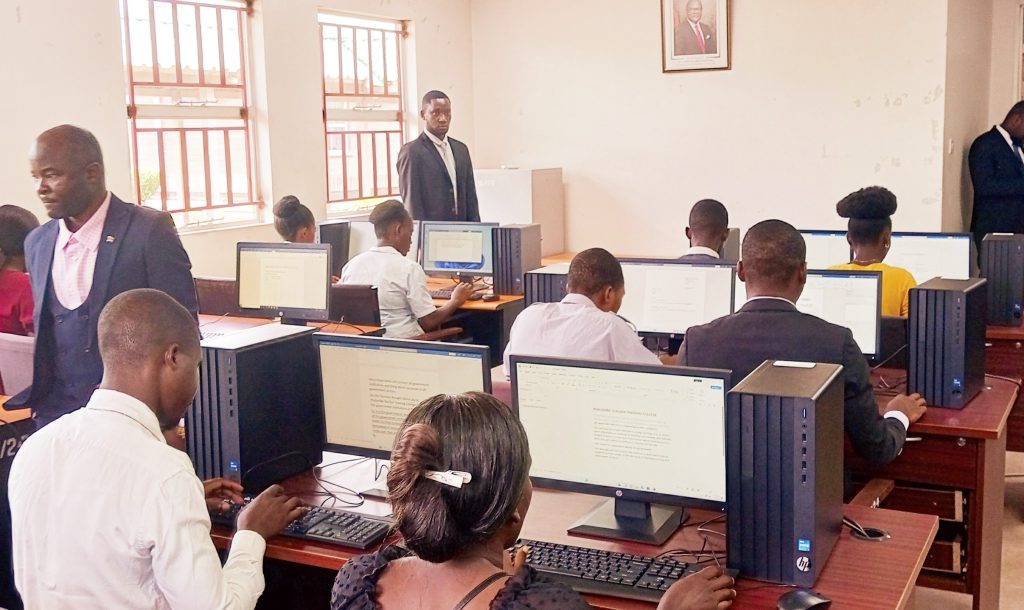Macra takes ICT to teachers’ colleges
Felix Julo, 21, a first-year student at Phalombe TeachersTraining College (TTC) is thrilled with the 15 desktop computers donated by the Malawi Communications Regulatory Authority (Macra).
With his fingers firmly on the keyboard, his eyes pop to the monitor to see the typed letters and figures.

The excitement glistening in his eyes brings to life astronaut Neil Armstrong’s words when he stepped on the moon in 1969: “One small step for man, one giant leap for mankind.”
Raised by a single mother since his father died in 2006, the student teacher with paralysed hands and legs had no access to a computer at the college of 262 students against seven computers.
“With the new computers,” says Julo, who comes from Lolo Village, Traditional Authority Nazombe in Phalombe District “I now have a chance though a laptop computer is more convenient for me.”
The high student-computer ratio at Phalombe TTC mirrors the dire shortage of information and communication technology (ICT) faced by many schools across the country.
Centre for Youth and Development (CYD) said learners in rural areas lack adequate resources and only three percent of Malawian students had a computer at school in 2015.
The high unmet demand for ICT tools and skills results in low literacy and the use of digital solutions in the Malawian workforce, where only 14 percent of people leaving secondary schools are suitably qualified.
Putting ICT tools at the centre of teaching and learning is key to closing the gap and ensuring the country reaps the benefits from investing in harnessing ICT solutions for the public good.
Recognising the importance of education, the National Digitalisation Policy Roadmap of 2022 to 2026 seeks to equip citizens with digital skills essential for active participation in the digital economy.
In line with the policy, Macra is investing its Universal Service Fund (USF) to connect TTCs like Phalombe.
The Connect-A-TTC initiative has contributed 150 computers to 10 TTCs across the country.
Speaking at the launch of the initiative, Minister of Education Madalitso Kambauwa Wirima said providing educators with the necessary ICT tools and resources lays the groundwork for transformative learning experiences.
“The investment enables teachers to seamlessly integrate ICT into their teaching methods, fostering a dynamic and engaging environment for our students,” she said.
Phalombe TTC acting principal Carolyne Malowa Chirwa says the computers will significantly narrow the student–computer ratio at the institution.
To ensure that ICT services are accessible to all learners, Macra has constructed 100 computer laboratories with 40 desktop computers in each.
It plans to construct 9 000 computer labs across the country.
“It’s a tall order, but a journey of a thousand miles starts with a single step,” says Macra’s director general Daud Suleman. “Next year, we intend to construct 500 more.”
Yet, while access to ICT infrastructure is being improved, access to the Internet remains low.
According to the 2023 Freedom House’s Freedom on the Net, Malawi, with its population of more than 19.9 million people, has one of the lowest rates of internet access in the world.
DataReportal indicated an internet penetration rate of 24.4 percent as of February 2023.
According to Macra, only one million of the 13.5 million registered phone SIM cards in the country are connected to the Internet.
“This means 12.5 million are non-smartphones that cannot connect to the Internet, a major barrier to our mandate of ensuring that every Malawian has access to the Internet,” says Suleman.
The high cost of smartphones in the country hinders many Malawians from accessing the Internet and digital services, he argues.
Suleman disclosed that the regulator is lobbying Parliament for a two-year tax holiday on smartphones to increase access to the Internet for all Malawians, including learners.
A 2022 study on taxation in the ICT sector proposed a reduction or removal of airtime excise duty of 10 percent and the removal of a copyright levy of 10 percent on SIM cards and five percent on mobile phones.
The study also proposed the removal of the Malawi Bureau of Standards (MBS) ICT levy of 0.5 percent on all imported ICT equipment and zero rating or relief from the reduction of the standard value-added tax (VAT) rate.
Minister of Information and Digitalisation Moses Kunkuyu supports the rising call for a tax break.
He said in an era where digital transformation is vital for socioeconomic growth, having more Malawians access the Internet will spur economic progress.
Kunkuyu states: “Those without internet access are effectively shut out of an increasingly digital world of essential communication platforms and important services such as mobile banking and money services, which could help lift them out of poverty
“We hope other ministries such as Finance will see merit in the cause.”





